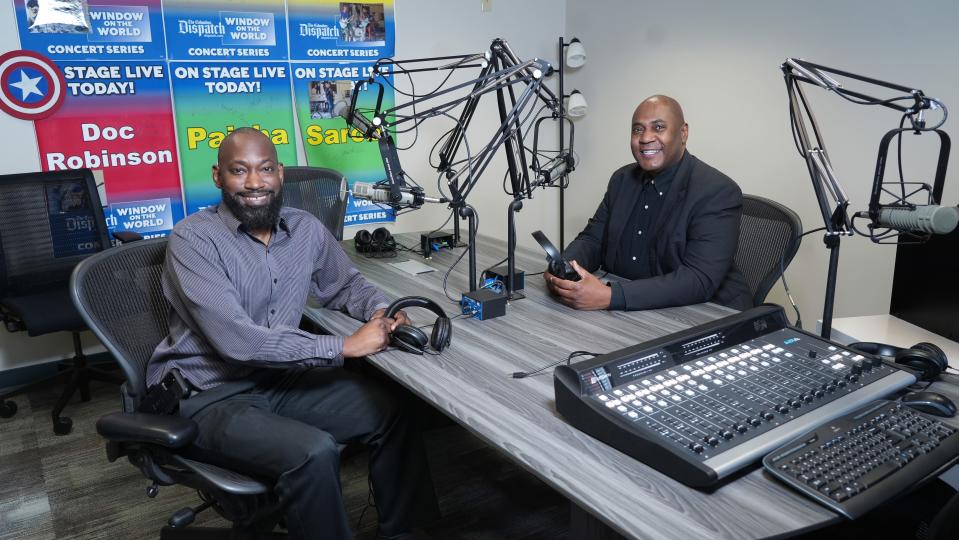He 'knew no strangers.' Terrance Dean demonstrated the power of connecting people| Opinion

Toni King is a professor of Black Studies and Women’s and Gender Studies at Denison University. She is director the Center for Black Studies.
During the month of August, I lost a colleague and friend.
Dr. Terrance Dean passed away suddenly after a brief illness. He was only 53.
More:Denison professor, Dispatch editorial board member Terrance Dean - ex-MTV exec - dead at 53
I had missed only a few days of being in touch with him by phone and text. Terrance was the kind of person who often took the first step to reach out to others and find out how they were doing. He was often the first person to take the initiative to connect with someone to share an idea for a project or collaboration.
He was often the first person to extend an invitation to lunch or dinner. He often joked with me about social gatherings in which he knew how to “work a room,” as the saying goes.
That is, he understood how to immediately engage with other people no matter how large the social gathering, or whether he already knew those in attendance or didn’t know anyone at all. One might say he was the kind of person who “knew no strangers” and they would be right.
So, what can we take away from the passing of a great soul who connected us one to another? I think Terrance would want us to make connecting to others an art. Terrance designed living experiences.
He thought of projects to create, problems to solve, innovations to launch. Once he had an idea, he drew on his existing network of connections, or simply picked up the phone and made new connections. For example, soon after he began teaching at Denison University, he met a student who was interested in the field of broadcast communication. Not long after, the student arrived at my office beaming.
More:Get to Know Terrance Dean, CMA's First Aminah Robinson Scholar-in-Residence
She announced that Dr. Dean had helped her land an internship with a radio station!
When I asked Dr. Dean — how he happened to know just the right person to connect her with — he shrugged with amusement and said “I didn’t know anyone. I just looked on the internet to find a good contact and picked up the phone and called.”
Similarly, Dr. Dean brought together a team of faculty at Denison to participate in a health equity conference through collaboration with Malaika L. Brewer, director of the Office of Health Equity Promotion at the Center for Public Health Innovation.
The result of that collaboration is that my colleague Dr. Griffith, director of Denison’s Global Health Program and myself, director of the Black Studies Program at Denison — along with Terrance Dean — participated as presenters for the “Racial Equity through Action & Learning: Laying the Groundwork" summit.
Dean: Mask up for 'invisible' people who do the work others are 'embarrassed to do'
Terrance’s art of connecting was not limited to Denison.
As a community representative on the Columbus Dispatch's editorial board, he both encouraged others to write editorials and wrote his own.
His voice was vivid, personal, compelling.
I recall his column on the Aminah Robinson exhibit, "Raggin’ On" at the Columbus Museum of Art. Terrance wrote: “Although her exhibition, 'Raggin’ On,' has ended, its message is forever embedded on the hearts, minds, bodies, and memories for those of us who had the fortune to experience her…”
But beyond these connections that led to collaboration, I am struck by deeper connections many of us had to Terrance. This first week of classes, I have sat with students as they tell stories of what this professor meant to them, what he challenged them to do and what he inspired them to be. In pausing to connect, I have come to reflect on how much Terrance is still giving us.
Dean: The power of Aminah Robinson: She captured 'Black love' living in plain sight
He is still connecting us.
For me, these connections on campus have been a kind of walking communion. Not the kind of communion of my Catholic upbringing. Rather, the kind that comes from community and union with others.
Terrance connected us as the family he chose, the village he crafted and the worlds he traveled. Even upon his passing, Terrance is still bringing us into connection, community and union.
Thank you, Terrance.
Toni King is a professor of Black Studies and Women’s and Gender Studies at Denison University. She is director the Center for Black Studies.
This article originally appeared on The Columbus Dispatch: Opinion: Late Denison professor connected people and inspired change

 money
money 